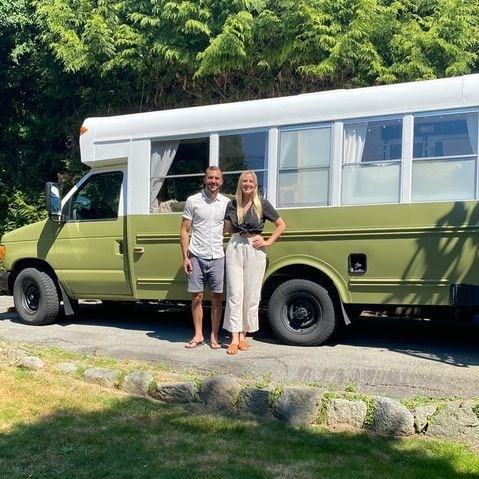While the COVID-19 pandemic put a pin in most people's travel plans, for Maddie Thompson and Jordan Tait it provided inspiration and opportunity.
Those two concepts coalesced recently, as the pair finished up . A former school bus (a 2002 Ford E350 Giardin), it spent some time as travelling accommodation for another man before the pair, inspired by a trip to Australia, took the opportunity to create a travelling home and office themselves.
The couple arrived in Australia around the same time as the virus, February 2020. The plan was to live and work for a year, but COVID-19 slowed those plans as they were locked down in Brisbane for weeks. To reignite the trip the pair bought an old station wagon.
"That was our first taste of the camper van lifestyle," Thompson says. "A station wagon and two-person tent."
While on the road they were introduced to the skoolie world. Essentially, there's a growing movement of people living full or part-time in converted school busses.
"The skoolie culture in Australia, that's when we got that inspiration," says Thompson, explaining it changed their perspective on what a work-life balance might look like.
They got back to Canada they decided to take on the challenge of customizing a school bus themselves.
"We came back to Â鶹´«Ã½Ó³»and with COVID lockdown, we felt like we need a project to keep us busy," says Thompson. "One day Facebook Marketplace put up 'Suggested for you' and there was this bus."
Build-a-bus
That was in January. They went and checked out the 19-year-old people mover, which started off on the other side of the country.
"It actually originated in Quebec and it was basically a wheelchair bus," says Tait. "It was originally on the east coast; the guy we bought it off of drove it around North America for four years."
He'd converted it, but it was in rough shape. There was rust, mold, cracked floorboards and the engine didn't run well. It was going to be a project. But there were positives; Tait can stand up inside, not something someone like Tait, who's around 6'2", can do in many vehicles.
The size was important in another way, too.
"We both are self-employed freelance remote workers," says Thompson. "We realized quickly having a space we could travel and work from is really important."
A van would be too small, but with some creative designing, the little bus could fit it all.
When they started in January they were hopeful buying a partially renovated vehicle would make life easier. It doesn't appear that was the case.
"We thought we wouldn't have to do a ton of work," says Tait. "We had to fully gut it down to the metal frame."
They spent the first month just on the teardown, taking everything down to the frame.
"We ended up finding a 1-foot-by1-foot hole near the driver's seat," says Tait.
While it was more expensive than they expected, most things they were able to do themselves (they only needed a welder to come in and remove wheelchair bolts).
Then they got to building up: rust proofing, painting, rebuilding, designing. Luckily they were already involved with the skoolie community, who's active and helpful online.
"We drew up a plan and I started to measure everything and we started to talk about how big the bed should be," says Tait. "We went really deep into the floor plan."
They decided on the essentials: a queen bed, sink, fridge, Coleman stove, and a table workspace. From there, storage became a big deal in their design.
"We wanted a table we could both work at on our laptops," says Tait. "It's pretty nice to be pulled up in a forest or on the ocean and look up and see the ocean, feel a breeze."
The three-month build meant the dust was settling and finishing touches drying late this April, though that is up for debate in a way.
"It's one of those projects that I don't know if it will ever feel finished," says Thompson. "I'm into the idea of putting a sun deck on the roof, but maybe that's a little down the road."
Fleetwood mechanical
Now dubbed Fleetwood (aka Fleety), they've started travelling in their creation. Right now it's shorter trips than what's possible, getting away a couple times a month.
"We started with baby steps," says Thompson. "We're working our way up to be able to put in a couple of weeks."
Right now local travel is king, with trips to the Island and up the coast.
"I think we're riding this new wave of local travel," says Thompson. "We've connected with other couples and individuals who've kinda done the same thing."
The community is welcoming, they add, and often they find themselves in conversations with others about their customized travel-mobiles (Tait calls it a magnate for interesting people). Each one is built to suit the needs of the person who built it. The number of people looking at a similar lifestyle is growing, they think, with the pandemic causing people to rethink work-life balance, where they work and having more freedom in where they are.
"Now that they're not tied to an office every day they're questioning things," says Tait.
While they aren't looking to live full-time out of Fleetwood, the idea isn't crazy. Others are living in their own vehicles.
"I think overall it's becoming a lot more commonplace and accepted thing," says Thompson. "There's a lot of love and thought and care going into the vehicles."
For Tait and Thompson it's opened up a new set of travel opportunities, especially since it means they can work remotely on the road.
"We just turned 30 both of us and we've travelled a lot, but we felt like if we had the opportunity to travel more," says Tait. "It opens up such a more interesting life."



